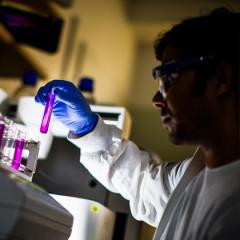University of Queensland researchers have developed a diagnostic device, called an Immuno-storm chip, that could identify which cancer and COVID-19 patients are at risk of a potentially lethal ‘cytokine storm’.

The device was invented at UQ’s Australian Institute for Bioengineering and Nanotechnology (AIBN) by Professor Matt Trau, Dr Alain Wuethrich and Junrong Li, and could help healthcare workers triage and closely monitor high risk patients and to begin treatment much earlier.
Cytokines are small proteins that act as messengers between cells in the immune system. They play a critical role in triggering inflammation by stimulating the movement of immune cells toward sites of injury or infection.
However, if the release of cytokines becomes uncontrolled, this causes hyperinflammation which damages tissue. This, in turn, causes more cytokines to be released in a vicious, potentially lethal cycle called a ‘cytokine storm’.
Cytokine storms can arise during a variety of diseases, as well as in response to immune-therapies, says Professor Matt Trau, a researcher at UQ’s Australian Institute for Bioengineering and Nanotechnology (AIBN).
“Around 80% of cancer patients that undergo cutting-edge immune therapy are likely to have an adverse response, such as a cytokine storm, for which there are currently no monitoring technologies,” he explains.
“Such adverse immune events are now also becoming associated with COVID-19 long-haul symptoms.”
Unfortunately, it’s very difficult to predict who will develop a cytokine storm. Until recently, they were thought to arise very suddenly, but there is now evidence that a very faint but distinctive pattern of cytokines begins to emerge several days before the full-blown storm.
Now, Professor Trau, Dr Alain Wuethrich and Ms Junrong Li have developed a nanotechnology device, called an Immuno-storm chip, that can detect this early warning signal on a miniaturised platform with minimal sample.

They designed a nanoscale array of gold pillars to which they attached antibodies that stick to specific cytokines in blood.
If these cytokines are present in a blood sample as small as a single drop, they will bind to the gold ‘nanopillars’.
These captured cytokines are then detected by gold-silver ‘nanotag’ particles.
The team designed these nanotags to emit light whenever they encounter a cytokine.
“When a single nanotag comes into contact with the presence of a single cytokine molecule, it becomes so bright that the single nanotag particle, and thus the single cytokine molecule, can be detected by conventional and inexpensive optical imaging equipment,” says Professor Trau.
“It’s possible to design the Immuno-storm chip to detect trace levels of any cytokine pattern of interest, including the pattern that heralds a gathering cytokine storm.”
“Such single molecule sensitivity from blood samples is thus many orders of magnitude more sensitive than any existing technology.”
The researchers were able to test the device via a collaboration with Dr Andreas Behren at the Olivia Newton John Cancer Centre in Melbourne, who also provided clinical samples.
The technology was originally developed to help cancer patients undergoing treatment, but the potential applications extend far beyond this, says Professor Trau.
“Cytokine storms can also arise during a variety of infectious diseases such as COVID-19 and Sepsis,” he says.
“For reasons we don’t totally understand — whether it’s due to genetics or immune history — around 1% of COVID-19 patients get a crazy cytokine storm.”
These patients experience extensive tissue damage —particularly in the lungs — and have a poor prognosis.
“It now seems clear that many COVID-19 deaths are caused by this mechanism,” he says. “Such adverse immune events are now also becoming associated with COVID-19 long-haul symptoms.”
“Whether in a cancer treatment setting or when monitoring infectious diseases such as acute COVID-19, long-haul COVID-19 and sepsis, the Immuno-storm chip could provide critical medical information that guides important clinical decisions,” he says.
“For example, it would allow hospitals to focus resources on patients at high-risk of a cytokine storm, while low-risk patients are monitored from home.”
“Critically, it could inform doctors to begin, or to ease off treatments, by accurately monitoring the patient’s immune response before it goes crazy.”
“Detection of the detailed cytokine signature for vulnerable COVID-19 patients with the Immuno-storm chip could also be used to personalise the therapy of these patients, tuned in to alleviate their specific excessive immune system response.”
Moreover, Professor Trau said the chip’s small size — about the size of a SIM card — meant the diagnostic technology could eventually be made relatively portable.
“The successful demonstration of the immune-storm chip technology opens up the possibility of partnering with other organisations to progress the chip into the clinic,” Professor Trau said.
The findings have been published in the journal Nature Communications.
Professor Trau is part of AIBN’s Precision Nanomedicine research, which is revolutionising the way we understand, diagnose and treat disease by designing technologies that interact with human cells and pathogens at the nanoscale - thousands of times smaller than the width of a human hair.


